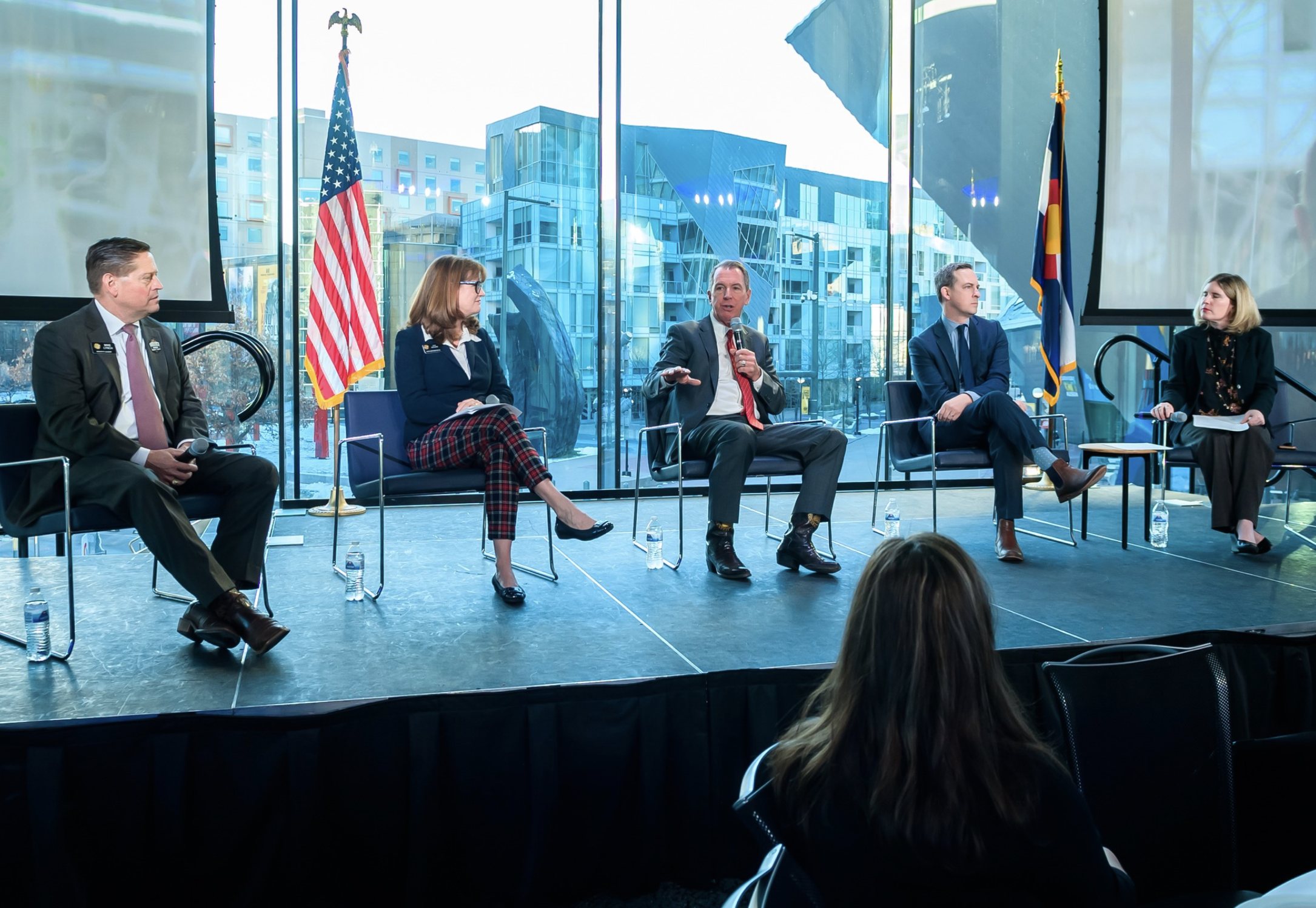Colorado’s business community heard firsthand from leaders of the Colorado General Assembly about its plans, priorities and predictions for the 2024 legislative session. The Denver Metro Chamber of Commerce and Colorado Competitive Council’s (C3) 2024 Business Legislative Preview provides a neutral platform for both parties to discuss what lies ahead for the business community. This year, the conversation centered on the Chamber’s priorities for session: housing, sustainability and economic competitiveness.
The Denver Metro Chamber’s President and CEO, J. J. Ament, and Vice President of Government Affairs, Carly West, were joined by Senate President, Senator Steve Fenberg; Senate Minority Leader, Senator Paul Lundeen; Speaker of the House, Representative Julie McCluskie; and House Minority Leader, Representative Mike Lynch. The conversation was moderated by the Political Reporter for Colorado Public Radio, Bente Birkeland. Featured speakers also included the Chamber’s Board Chair and Managing Partner at Grant Thornton LLP, Lori Davis; and C3’s Investor Committee Chair and Manager of State Government Affairs for Xcel Energy, Michael Sapp.
West emphasized in her remarks the Chamber’s policy pillars for the upcoming session: housing, sustainability and economic competitiveness. “The role of the Chamber’s government affairs team is to make sure we are representing the voices of our members at all levels of government,” said West. “As the leader of this team, my priority is to ensure I am aware and knowledgeable on the policy that matters to you, our members.”
The panel of legislative leaders was asked a series of questions focusing on the Chamber’s policy pillars.
Business
Birkeland started the conversation by quoting CNBC’s 2023 Top States for Business Survey, where Colorado fell from 4th to 11th place for the best place to do business from 2022 to 2023. She asked legislators if they were concerned about the drop, and how they plan to reduce costs for businesses and residents.
Lynch and Lundeen both focused on limiting government involvement, mandates and regulations in the business environment. “What we’re keyed into is making sure we can do whatever we can to get out of the way of the free market,” said Lynch.
“Our job is to represent. It’s to listen to the people. It’s to listen to the businesses who provide jobs to the people, and to be responsive to them,” said Lundeen.
McCluskie focused on building workforce development initiatives and upskilling workers, providing organizations with the skilled workers needed to bolster Colorado’s workforce. “The past two years,” stated McCluskie, “We have put into place pathways for free credentials to help bring back the workplace we lost in the pandemic.”
Fenberg seemed to take a middle of the road approach in regulations and mandate for the business community, stating that, “The answer can’t just be regulate the hell out of the state… and the answer can’t just be let’s get rid of all regulations. There has to be a balance.”
Housing Shortage
Birkeland then shifted to housing, asking each legislator what they believe are the biggest drivers for the housing shortage in Colorado, and how they can address these.
A common theme ran through the panelists that one of the biggest issues is barriers between communities that make it difficult to address housing shortages, with McCluskie focusing on, “How can we break down barriers between jurisdictions to collaborate.”
Lynch focused on communities having a larger say and role in housing policy for their regions. “I’m concerned that our state is going to override what the local communities know is best for them with development.”
Lundeen focused on lowering the cost of building and selling developments, stating, “We’re at least 200,000 units… for sale behind where we’re supposed to be.” Lundeen dove into the costs of insuring new units, saying this could significantly lower the cost of developing new housing units.
Fenberg stated that, “I think construction defects is part of [the solution], but by no means do I think it’s the answer.” After a follow up question from Birkeland, Fenberg also stated that we can expect to see many of the issues addressed in the failed Land Use bill from 2023 again in 2024. “Many of those items are going to come back one way or another,” said Fenberg.
Environmental Regulations
Birkeland also addressed air quality and environmental regulations, of which 60 have been passed in the last four years, asking panelists if they felt this pace is sustainable for Colorado businesses.
Lynch and Lundeen held similar views, stressing that these regulations are unsustainable for businesses and don’t have a clear impact. “These regulations directly impact the economy and a good part of our state,” said Lynch, stressing that business owners cannot keep up with the constant changes.
“We need to know what is the benefit of the investment we’re making,” said Lundeen, emphasizing that regulations meant to last several decades are only in place for a few years before being reevaluated.
Fenberg and McCluskie encouraged businesses to continue involvement in sustainability efforts. “It’s having a real impact on public health and it will have an impact on our economy,” said Fenberg, who stressed that there are times of the year where Colorado has some of the worst air quality in the country.
“I see businesses leading on this front in so many ways, particularly when it comes to the sustainability of our state,” said McCluskie, who encouraged businesses to continue their sustainability efforts.
Closing Remarks
Ament stressed that Colorado must continue its economic competitiveness efforts and that the Chamber “is going to work hard to make sure we can be pro-economy and pro-environment, and pro-business and pro-employee,” emphasizing that the two concepts are not mutually exclusive. He also encouraged legislators to work together in the upcoming session, saying, “These legislators are reflecting us and our community… they’re the results of our own community and our own behavior… We have to find some space between my utopia and your apocalypse… that’s where businesses and successful communities exist.”
You can stay up to date with the Chamber’s stances this session at denverchamber.org/policy/2024-legislative-session.









